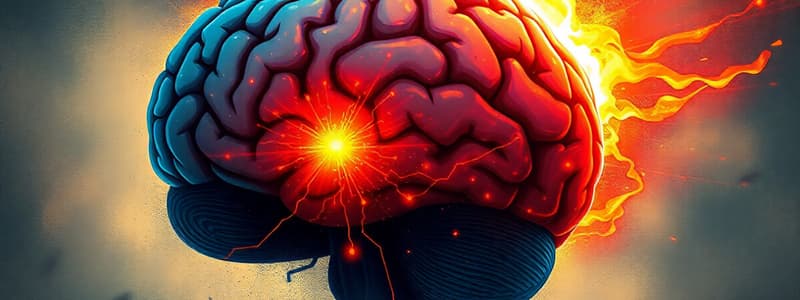Podcast
Questions and Answers
What is the primary focus of the executive order EO-23-001?
What is the primary focus of the executive order EO-23-001?
- To reduce physical injuries in police work
- To establish procedures for dealing with concussions and TBIs (correct)
- To mandate regular health check-ups for officers
- To enhance training on handling non-compliant suspects
Which of the following correctly defines a concussion/TBI as per the executive order?
Which of the following correctly defines a concussion/TBI as per the executive order?
- A blow or jolt to the head or neck that disrupts brain function (correct)
- An injury that always results in loss of consciousness
- A type of injury resulting from physical exertion
- A minor injury that does not affect brain function
What types of incidents might lead to a concussion or TBI for police officers?
What types of incidents might lead to a concussion or TBI for police officers?
- Regular office work
- Administrative meetings
- Routine equipment checks
- High-speed pursuits and vehicle accidents (correct)
What range of severity is associated with concussions and TBIs as outlined in the executive order?
What range of severity is associated with concussions and TBIs as outlined in the executive order?
What is a potential long-term effect of concussions and TBIs mentioned in the executive order?
What is a potential long-term effect of concussions and TBIs mentioned in the executive order?
Which of the following is a common symptom of a concussion or traumatic brain injury?
Which of the following is a common symptom of a concussion or traumatic brain injury?
What action should members take if they observe an officer who may have sustained a head or neck injury?
What action should members take if they observe an officer who may have sustained a head or neck injury?
Members who sustain a head or neck injury are required to report to which facility for screening?
Members who sustain a head or neck injury are required to report to which facility for screening?
Which symptom is not typically associated with concussions or TBIs?
Which symptom is not typically associated with concussions or TBIs?
What should officials do after witnessing a possible head or neck injury?
What should officials do after witnessing a possible head or neck injury?
Which of the following is a common misconception about the reporting of head or neck injuries?
Which of the following is a common misconception about the reporting of head or neck injuries?
What type of documentation should be made after observing a potential TBI on body-worn camera footage?
What type of documentation should be made after observing a potential TBI on body-worn camera footage?
Which symptom might indicate a more severe concussion or TBI?
Which symptom might indicate a more severe concussion or TBI?
Study Notes
Executive Order EO-23-001: Concussions and Traumatic Brain Injuries
- Issued by District of Columbia on January 30, 2023.
- Addresses procedures for identifying, reporting, and treating concussions and traumatic brain injuries (TBI) in sworn members of the District of Columbia Police Department.
- Acknowledges the inherent risk of these injuries due to the physical nature of police work.
- Defines concussions/TBIs as blows or jolts to the head or neck, or penetrating head injuries that disrupt brain function.
Procedures
- Any officer observing a possible head or neck injury, with or without loss of consciousness, must notify an official.
- Sworn members sustaining an on or off-duty head or neck injury must report it to an official and report to the Police and Fire Clinic (PFC) for concussion/TBI screening and medical evaluation.
- Officials are required to ask all members if they sustained a head or neck injury during incidents like assaults, vehicle crashes, falls, or other events where concussion/TBI is possible.
- Officials must ensure members report to the PFC for concussion/TBI screening:
- If they witness or are told of a possible head or neck injury
- After observing a possible head or neck injury on a body-worn camera (BWC) recording
- Officials must promptly notify the PFC via phone or email of any members referred for concussion/TBI screening.
Symptoms of Concussions/TBIs
- Anxiety
- Balance problems
- Brain fog
- Concentration problems
- Depression
- Disorientation or confusion
- Dizziness
- Excessive fatigue
- Headache
- Impaired judgement
- Memory problems
- Nausea
- Noise or light sensitivity
- Personality changes
- Sleep problems
- Tinnitus (ringing in the ears)
- Vision changes
Studying That Suits You
Use AI to generate personalized quizzes and flashcards to suit your learning preferences.
Related Documents
Description
This quiz covers the key elements of Executive Order EO-23-001, focusing on the procedures for identifying, reporting, and treating concussions and traumatic brain injuries among sworn members of the District of Columbia Police Department. Understand the significance of these protocols in ensuring the health and safety of police officers in a physically demanding role.




